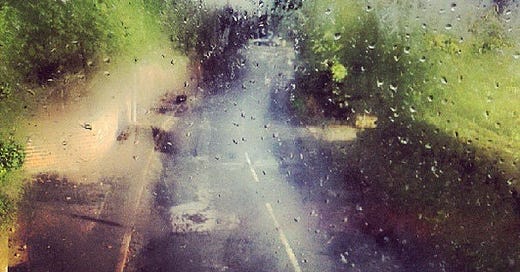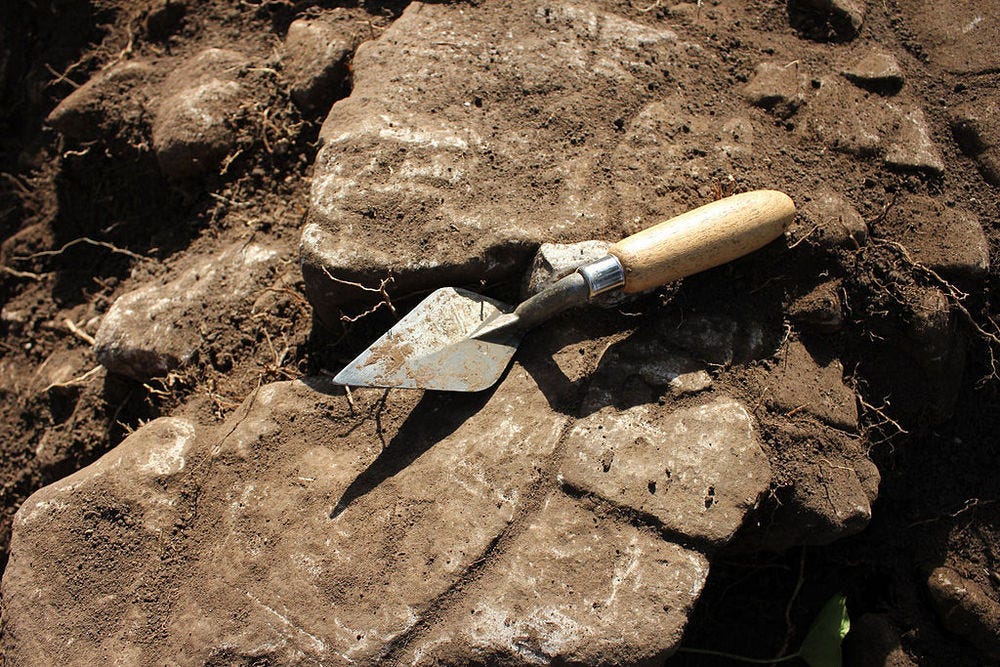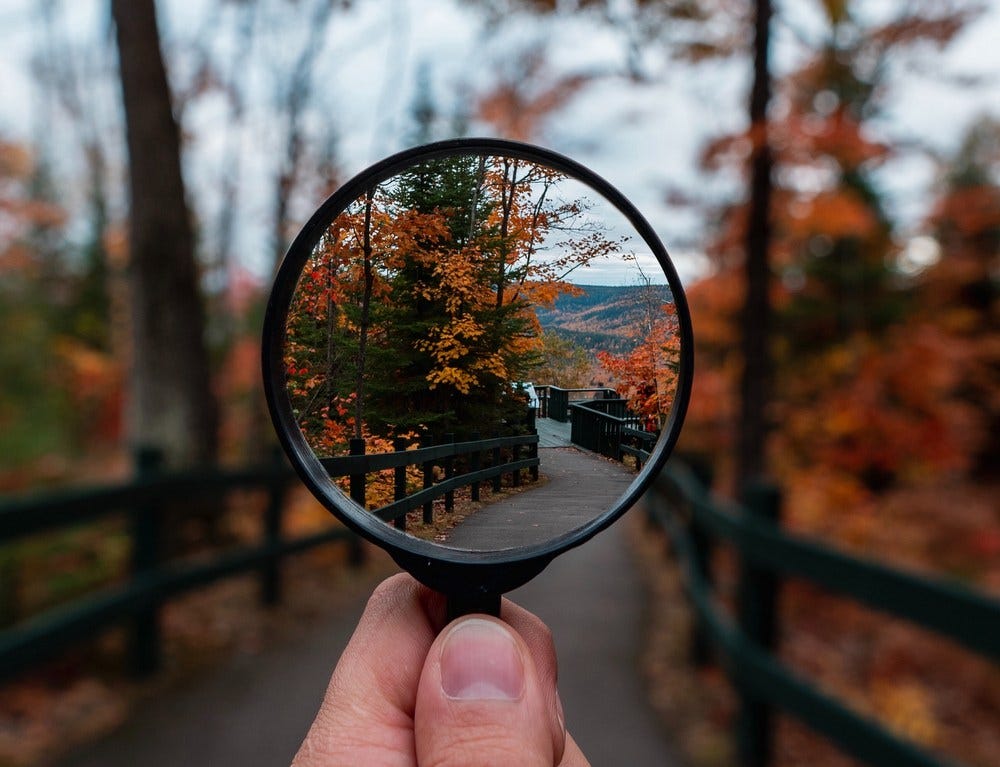Hi again!
It’s time to wrap up this first season of Everything Is Amazing.
Ten weeks ago I laid out my plans for this newsletter: what I’d write, when I’d write it, how much I’d risk nerding out about my love of scifi, what extended metaphors I would torture and so on.
And the reality? Well, things got a bit ragged in recent weeks, as some very welcome but time-guzzling paid work landed like a ton of bricks. That’s why this eight-week run took ten weeks to arrive - teaching me a few lessons about managing my time better along the way. (You never learn these things until you start!)
Below you can find a summary of everything covered so far. Next, I’m taking a 2-week break, to catch up on work, get some sunshine, climb a nearby mountain (cheers to that, just-relaxed Scottish travel restrictions) and plan out the next season. I’ll be back with you again at the end of the month.
(If you're not yet on the list, sign up below.)
But before all that: thank you. I know your email Inbox is under siege every day - so I’m very grateful you’ve put time aside to read this newsletter.
And I also know from the calls I’ve been having with some of you - which I’m still doing, so grab one if you’re up for it - that a good number of you have thrown yourself into the challenges and not regretted it! This tells me two things: One: you’re at least as mad than I am, and Two: I clearly need to crank up the gleeful sadism. I promise I’ll work on that for both our sakes. (Okay, mainly mine.)
If you’ve enjoyed things so far, you could do me the hugest favour by spreading the word about it, or encouraging someone you know to sign up too:
Thank you from the bottom of my nerdy, sadistic heart if you choose to do that. The bigger I can grow this thing, the more time I can justify on it and the better it’ll be. (Working theory, mind. Maybe it’ll get worse! Only one way to find out.)
Okay. Here’s the ground we’ve covered since the end of January.
Deep Dives
Oh, To See, To Truly See
“It’s estimated that a staggering 99% of the sensory world is escaping our fullest level of attention every day – and because of all our cognitive biases at work, we can’t always trust our unconscious minds to choose the good stuff for us.”
Takeaways:
“Unseeing” (automatically tuning out what we assume is irrelevant or uninteresting without paying proper attention to it) is real, and we spend our whole lives doing it every day.
What we “unsee” is programmed into us by all sorts of internal and external influences.
This delicously weird book will blow your mind on this topic. Also, I mentioned author Jeff VanderMeer in that piece - and Jeff just wrote this dazzling essay about finding transformative wonder in the world around us. It’s such a treat. (Hat-tip to Jodi for the find.)
In Search Of A Prince Of Serendip
“Perhaps because of the sheer dullness of the example Walpole chooses to illustrate his theme, the term serendipity would take at least a century more to catch on (the first recorded use of serendipitous is from 1943).
But now? Now it’s firmly in the public domain – and good job too, because we’ve never needed it this badly.”
Takeaways:
We’ve just endured a year-long serendipity drought (thanks, lockdowns) - and it’s been tipping us towards anhedonia, the inability to feel interest and pleasure in our surroundings.
Overhearing snippets of conversation in public that make you intensely curious about the inner lives of strangers is a soothing way to get out of your own head for a while.
It’s amazing what you could discover just a mile from where you’re reading this. You’d be amazed. (All you need is a stupid excuse to go look.)
Avoid Reading ClickBait Hogwash With This One Curious Trick
“[By quitting the internet for a year], what [journalist Paul Miller] found…was a lot of emptiness and silence. Both were welcome at first. Being able to hear himself think and take his time over everyday activities? Delightful.
But then novelty wore off - and his problems began…
“By late 2012, I'd learned how to make a new style of wrong choices off the internet. I abandoned my positive offline habits, and discovered new offline vices. Instead of taking boredom and lack of stimulation and turning them into learning and creativity, I turned toward passive consumption and social retreat.”
The internet was part of the problem, yes, but quitting it didn’t seem to be that golden ticket to a richer, less distracted life that Miller thought it would be.
So what will work?”
Takeaways:
“Waldenponding,” a full, hard ‘digital detox,’ simply doesn’t work for most people.
Clickbait (easily consumed, largely meaningless online stuff) is powered by diversive curiosity, the love of shiny new things - at the expense of our epistemic curiosity, the deepening of knowledge around what we already know a little about. Happiness is both of these in balance.
First Law of Curiosity: You just have to try lots of different stuff for no damn reason.
How To Remember What Really Matters
“It’s December 4th, 2016, and American chess Grandmaster Timur Gareyev is dozens of moves into a game against his human opponent….[and] there’s a blindfold over his face.
This isn’t a new thing for Gareyev…but this time, he’s really going for it. Starting at 8.30am in a room on the campus of the University of Nevada, Gareyev has been playing chess simultaneously against 48 opponents without being able to see any of their moves.”
Takeaways:
Sitting perfectly still for hours seems like a really terrible way to learn and remember something.
Curiosity releases dopamine, the same neurotransmitter released by exercise, chocolate, sex and other fun things, which seems to help your hippocampus function better - a part of the brain strongly associated with learning and memory.
We shouldn’t be surprised to learn that some chess players are absolutely ripped.
When I Grow Up, I Want To Be A Carrot
“The scientific measurement of curiosity is NFC, or Need For Cognition. This is the closest there is to a unit measurement of curiosity…and it’s more or less our eagerness to learn new things, to be open to new ideas and experiences, and to exert effort in closing information gaps…
Also, interestingly, NFC is negatively associated with social anxiety. It seems like the more curious you become, the less you fall prey to being freaked out by social situations and feeling like a total plonker every time you open your mouth.”
Takeaways:
Terry Pratchett really understood the kingdom-ruling power of simplicity.
Your brain is a universe-sized collection of extremely simple things working together to do exceedingly complicated things. There’s a good life-lesson there.
If you just want to go walking in the mountains by yourself, and someone unwelcomely invites themselves along, send them a link to this newsletter. You’re welcome.
The Unexamined News Is Not Worth Believing
“Welcome to the first, and most important, of the cognitive biases I want to talk about in this newsletter in relation to curiosity:
“…across an array of psychological situations and tasks, adults display a negativity bias, or the propensity to attend to, learn from, and use negative information far more than positive information.” - link.
Not only are we exhausted from all the depressing news out there, we’re also hooked on it. It seems we can’t stop obsessing over what’s crappy and awful, even if it’s wildly unrepresentative of the amount of crappy, awful things out there.”
Takeways:
Nothing travels faster, or carriers further, than bad news - skewing our perception of how much of a mess the modern world is in.
Despite their…often unfortunate reputations, philosophers have so much to teach us. Even the modern ones! (Shut it, Charlie Brooker.)
An opinion, especially a hastily-formed one, cuts curiosity off at the knees and yanks you off the path towards deeper understanding. A better approach is to sit with a question as long as you can - and to not write an answer off merely because it looks “non-newsworthy”.
Stupid Questions
How did my colourblind dad works as a Royal Air Force helicopter technician without blowing any of them up? (As part of the answer, did you know colourblindness is a superpower?)
How hard is it to memorise your own coastline? (Pretty damn hard if it’s Scotland - I’m still practising.)
What can you learn if you write down everything you can hear?
What has learning the names of plants got to do with the Ben Franklin effect?
How do you spark conversations with random strangers during a pandemic lockdown?
Why do some people hate drinking coffee but love the smell of it? (Answer: because human noses are super-weird.)
Curious Interviews
Anna Brones Is Living A Curious Life
“In the last year, I think for a lot of people, curiosity has been smaller. Pre-COVID, I probably would have said that my curiosity is fueled by travelling, being in new places. And now - I had a friend ask me the other day, “can you think of the last time that you didn't travel for a full year?” And it's been a long time. And so now curiosity is in, like, learning about the tides, or looking at the bark of a tree. And I think that is a challenge: to be able to find curiosity even with the most routine activities, and in the most well known places. Because it's really easy to be curious when you're in someplace entirely new, right?”
Candace Rose Rardon Is Exploring Stillness
”I felt like I wasn't making the time to actually do something with all the experiences I was having and the trips I was going on. There was all this raw material - it's like when you have an SD card full of pictures, and you just never take the time to sit down and unload it onto your hard drive and actually organise and make sense. For me, that process of organising them into folders is - it's so nerdy, but it's so helpful, it makes me feel like okay, I'm starting to make sense of it all, there's some order. You have to go through the raw, messy chaos of life, whether you're travelling whether you're at home, it’s always messy. And then there are moments where you can step back from it all - and start to find some meaning in the mess.”
Sophie Stephenson Is Teaching Attention
“Listening is a byproduct. So when you pay attention, you end up becoming a good listener. I knew I wanted to be a good listener - it became apparent in my role that it was limiting me and limiting the people around me that I wasn't listening to. And yet now I very rarely think about listening. I think more about paying attention. Where's my attention right now? And because of that, I end up not interrupting, which makes me a better listener.”
Ridiculous Challenges
Week 1: Explore your nearest mile every day; Strike up a conversation with “yourself”; Lagom your possessions; Learn to write at the speed you think; Listen to everything by a musician you really dislike.
Week 2: Learn to draw your own country from memory; Move a daily ritual outside; Become the world’s top expert on your own birtthday; Reply to your most dreaded letter or email; Spend at least 30 minutes sketching something by hand.
Week 3: Take a virtual journey; Plant something outside {& create a prompt to return to it); Reread something you loved or hated; Remove “But” or “No” from your vocabulary; Become a digital self-archaeologist.
Weeks 4+5: Sleep in the garden; Start one of these three types of journal; Drink more water; Learn to fold clothes better; Master the first 60 seconds of your day.
Weeks 6+7: Talk (properly) to a stranger; Master (or become skilled at) a videogame that’s good for your brain; Pay full attention for five minutes; Learn how to make a fire outdoors; Audit your body and address a nagging problem.
Weeks 8+9: Teach the basics to someone who doesn’t know them; Delay your gratification; Lose yourself in your own thoughts; Buy a stranger a coffee (or a “coffee”); Dip your toes in two oceans without spending any money getting between them.
That’s a wrap. See you in a couple of weeks!
Images: Chris Lawton; Jeremy Thomas; Kyle Glenn; Icons8 Team; Mike Sowden.









